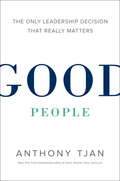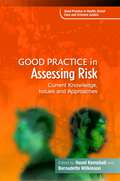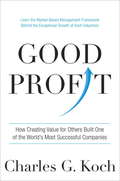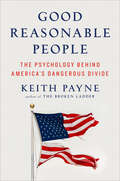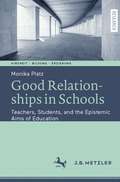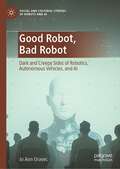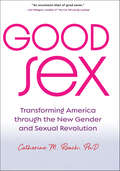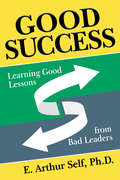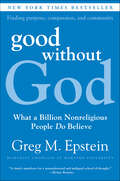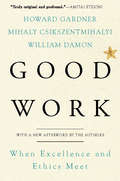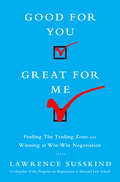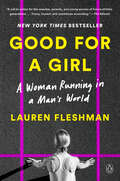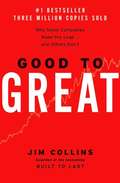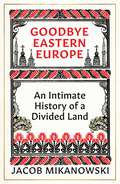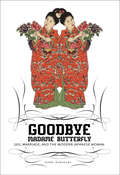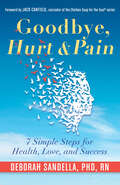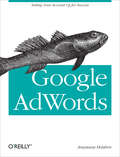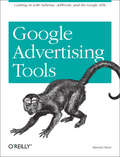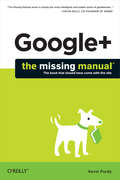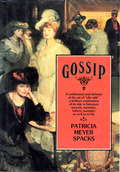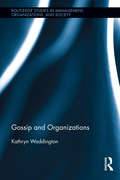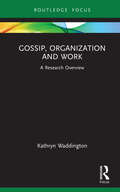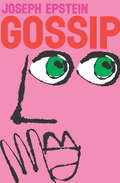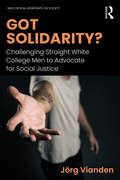- Table View
- List View
Good People: The Only Leadership Decision That Really Matters
by Anthony TjanGood people are your organization’s most critical asset. But what does it really mean to be good?Leaders love to say that any company is only as good as its people, but tend to evaluate candidates and employees more by their measurable accomplishments than by their “softer” qualities, like integrity, compassion, and other values. Bestselling author Anthony Tjan is leading a movement to change the way we think about goodness so that we can become better judges of people and create more goodness in ourselves, in others, and in our organizations. Tjan argues that while competence is necessary, real goodness must also encompass values; a fantastic résumé can never compensate for mediocre character. In Good People, he provides a clear language to discuss goodness, redefining it as a lifelong, proactive commitment that, like any skill, can be exercised, honed, and taught. When leaders prioritize goodness in themselves and in others, they can create lasting cultures and tremendous value. Drawing from his own experiences as an entrepreneur and venture capitalist, Tjan also taps into the wisdom of his relationships and interviews with extraordinary innovators, executives, artists, academics, teachers, and role models from all disciplines and walks of life. The cases and profiles shared include: Harvard Business School Dean Nitin Nohria, who has called for balancing leadership of competency with leadership of character; Supreme Court Justice Sonia Sotomayor, who has never forgotten her roots and shows profound kindness to her staff and clerks; Hollywood talent manager Shep Gordon, who has counseled his clients on the importance of generosity and gratitude; legendary venture capitalist Henry McCance, whose success proves that humbly ceding the spotlight to others makes room for their greatness; and master jazz musician Clark Terry, who devotedly mentored the young, blind pianist Justin Kauflin. Packed with practical yet often surprising advice, Good People establishes a new language and framework you can use to evaluate, develop, and lead with goodness. Tjan will convince you that there is a hard truth in the “soft stuff” of business, and that choosing and working well with good people is truly the only leadership decision that really matters.
Good Practice in Assessing Risk
by Bernadette Wilkinson Edited by Hazel KemshallMaintaining a balance between managing and assessing risk and upholding the required high standards of practice in health and social care can be demanding, particularly in the current climate of increased preoccupation with the difficult tensions between rights, protection and risk-taking. Good Practice in Assessing Risk is a comprehensive guide to good practice for those working with risk, covering a wide variety of health, social care and criminal justice settings including child protection, mental health, work with sex offenders and work with victims of domestic violence. The contributors discuss a range of key issues relating to risk including positive risk-taking, collaborating with victims and practitioners in the design of assessment tools, resilience to risk, and defensibility. The book also explores the role of bureaucracy in hindering high quality professional practice, complex decision-making in situations of stress or potential blame, and involving service users in assessment. This book reflects the latest policy and practice within health, social care and criminal justice and will be an invaluable volume to all professionals working in these fields.
Good Profit: How Creating Value for Others Built One of the World's Most Successful Companies
by Charles G. KochTHE UNIQUE MANAGEMENT SYSTEM FROM A LEGENDARY CEOIn 1967, Charles Koch took the reins of his father’s company and began the process of growing it from a $21 million start-up into a global corporation with revenues of about $115 billion, according to Forbes. So how did this MIT engineer manage grow Koch Industries into one of the largest private companies in the world today with growth exceeding that of the S&P 500 by almost 30-fold over the last five decades? Through his unique five-dimensional management process and system called Market-Based Management. Based on five decades of cross-disciplinary studies, experimental discovery, and practical implementation across Koch companies and their 100,000 employees worldwide, the core objective of Market-Based Management’s framework is as simple as it is effective: to generate good profit. What is good profit? Good profit results when a company creates value for customers in a way that helps them improve their lives. Good profit is the result of innovations that customers freely vote for with their own dollars; it’s the result of business decisions that create long term value for everyone--customers, employees, shareholders, and society.While you won't find the Koch Industries name on your home’s stain-resistant carpet, your baby’s more comfortable but absorbent diapers your stretch denim jeans, or your television with a better clarity screen, MBM™ drove these innovations and many more. Here, drawing on revealing, honest stories from his five decades in business – the company’s many successes as well as its stumbles – Koch walks the reader step-by-step through the five dimensions of Market-Based Management to show stockholders, entrepreneurs, leaders, students -- and innovators, supervisors and employees of all kinds, in any field --how to apply the principles to generate Good Profit in their organizations, companies, and lives.From the Hardcover edition.
Good Reasonable People: The Psychology Behind America's Dangerous Divide
by Keith Payne&“An eye-opening analysis of why our politics have become so polarized….Keith Payne illuminates one of the biggest problems of our time and lights the way toward some promising solutions.&” —Adam Grant, #1 New York Times bestselling author of Think Again "Good Reasonable People challenges each of us to drop the weapon of demonization and replace it with something more powerful: a framework for understanding—and for being understood by—people who see the world differently from us." —Margot Lee Shetterly, #1 New York Times bestselling author of Hidden FiguresA leading social scientist explains the psychology of our current social divide and how understanding it can help reduce the conflicts it causesThere has been much written about the impact of polarization on elections, political parties, and policy outcomes. But Keith Payne&’s goal is more personal: to focus on what our divisions mean for us as individuals, as families, and as communities. This book is about how ordinary people think about politics, why talking about it is so hard, and how we can begin to mend the personal bonds that are fraying for so many of us.Drawing upon his own research and his experience growing up in a working class, conservative Christian family in small town Kentucky, Payne argues that there is a near-universal human tendency to believe that people who are different from us are irrational or foolish. The fundamental source of our division is our need to flexibly rationalize ideas in order to see ourselves as good people. Understanding the psychology behind our political divide provides clues about how we can reduce the damage it is causing. It won&’t allow us to undo our polarization overnight, but it can give us the tools to stop going around in circles in frustrating arguments. It can help us make better choices about how we engage in political debates, how policy makers and social media companies deal with misinformation, and how we deal with each other on social media. It can help us separate, if we choose to, our political principles from our personal relationships so that we can nurture both.
Good Relationships in Schools: Teachers, Students, and the Epistemic Aims of Education (Kindheit – Bildung – Erziehung. Philosophische Perspektiven)
by Monika PlatzThe relationship between teacher and student is an important element of school education and as such irreplaceable: If we want schools to be good places for those who teach and learn there, we must make sure that the educational relationships between teachers and students are good, too.In research about school education, surprisingly little attention is paid to the normative dimension of the relationship between teacher and student. This lacuna points to a desideratum in the philosophy of education: More should be said about the normative structure of the teacher-student relationship, its role in teaching and learning, and its final value for teacher and student.Answering these fundamental philosophical questions is the core of this book. It offers a normatively rich concept of a good teacher-student relationship that is based on the analysis of two major relationship goods: trust and care. Moreover, the book explains the instrumental value of a good educational relationship for the student’s achievement of epistemic aims of school education as well as the final value of such a relationship for teacher and student.
Good Robot, Bad Robot: Dark and Creepy Sides of Robotics, Autonomous Vehicles, and AI (Social and Cultural Studies of Robots and AI)
by Jo Ann OravecThis book explores how robotics and artificial intelligence (AI) can enhance human lives but also have unsettling “dark sides.” It examines expanding forms of negativity and anxiety about robots, AI, and autonomous vehicles as our human environments are reengineered for intelligent military and security systems and for optimal workplace and domestic operations. It focuses on the impacts of initiatives to make robot interactions more humanlike and less creepy (as with domestic and sex robots). It analyzes the emerging resistances against these entities in the wake of omnipresent AI applications (such as “killer robots” and ubiquitous surveillance). It unpacks efforts by developers to have ethical and social influences on robotics and AI, and confronts the AI hype that is designed to shield the entities from criticism. The book draws from science fiction, dramaturgical, ethical, and legal literatures as well as current research agendas of corporations. Engineers, implementers, and researchers have often encountered users' fears and aggressive actions against intelligent entities, especially in the wake of deaths of humans by robots and autonomous vehicles. The book is an invaluable resource for developers and researchers in the field, as well as curious readers who want to play proactive roles in shaping future technologies.
Good Sex: Transforming America through the New Gender and Sexual Revolution
by Catherine M. RoachThe United States may have a puritanical past, but the 21st century is wide open to diverse gender expression and romance. Good Sex is the manifesto—or Manisexto, if you will—for this cultural revolution. Same-sex marriage is legal, the #MeToo movement has exploded, colleges nationwide now teach consent-based sexual health, the media celebrates body positivity, and transgender visibility has become mainstream. Defining "good sex" as both ethical and pleasurable, Catherine M. Roach features such topics as equity, intersectionality, and shared pleasure while offering a lively discussion that is inclusively feminist, queer-friendly, and sex-positive without being divisive.An accessible guidebook, Good Sex provides hope that America's sexual, gender, and racial injustices can be addressed together. After all, this new gender and sexual revolution strengthens the pursuit of happiness and love. Welcome to the revolution!
Good Success: Learning Good Lessons from Bad Leaders
by E. Arthur SelfThe purpose of Good Success is to help readers learn and integrate into their life and career the good lessons learned from bad leaders. Bad leaders drive organizational dysfunction, incarnate indecision, and deplete personal energy and team resolve. Also, bad leaders exhaust resources and hope. But, through Good Success readers gain the knowledge and the lessons to overcome the damage, shape their awareness, and build new courage to navigate beyond the chaos. Good Success enable recovery from the effects of bad leadership, creates the means to achieving self-mastery, brings closure to previous negative circumstances, and so much more. It is possible that those who work for bad leaders have already written-off any chance of benefiting from the chaos that they create. If so, Good Success helps readers draw a valuable inheritance from the F.E.A.R. (failures, experiences, anxieties, roadblocks) they’ve seen bad leaders produce.
Good Without God: What a Billion Nonreligious People Do Believe
by Greg EpsteinA provocative and positive response to Christopher Hitchens, Sam Harris, Richard Dawkins, and other New Atheists, Good Without God makes a bold claim for what nonbelievers do share and believe. Author Greg Epstein, the Humanist chaplain at Harvard, offers a world view for nonbelievers that dispenses with the hostility and intolerance of religion prevalent in national bestsellers like God is Not Great and The God Delusion. Epstein’s Good Without God provides a constructive, challenging response to these manifestos by getting to the heart of Humanism and its positive belief in tolerance, community, morality, and good without having to rely on the guidance of a higher being.
Good Work: When Excellence and Ethics Meet
by Howard GardnerWhat does it mean to carry out "good work"? What strategies allow people to maintain moral and ethical standards at a time when market forces wield unprecedented power and work life is being radically altered by technological innovation? These are the questions at the heart of this important collaboration by three leaders in psychology. Enlivened with stories of real people facing hard decisions, Good Work offers powerful insight into one of the most important issues of our time and, indeed, into the future course of science, technology, and communication.
Good for You, Great for Me: Finding the Trading Zone and Winning at Win-Win Negotiation
by Lawrence Susskind"Win-win" negotiation is an appealing idea on an intellectual level: Find the best way to convince the other side to accept a mutually beneficial outcome, and everyone gets their fair share. The reality, though, is that people do not want a fair share; they want to win. Tell your boss that you concocted a deal where your company got its piece of the pie, and the reaction is likely to be: "Maybe we need to find someone harder-nosed than you who knows how to win." However, to return to an earlier era before "win-win" negotiation was in fashion and seek simply to dominate or bully grudging opponents into submission would be a step in the wrong direction- and a public relations disaster.Into this dilemma steps renowned expert Lawrence Susskind with a brilliant new negotiation paradigm he calls "the trading zone." Good for You, Great for Me provides the missing operational guidelines for winning negotiations in business, family disputes, international relations, or public affairs without undermining trust or ruining relationships. It provides not just new principles but new tools- six operational steps to take after you've found your way into the trading zone- to ensure you get as large a share of the pie as possible.Good for You, Great for Me also provides guidance for handling special situations such as dealing with huge power differentials (the 900 pound gorilla), liars, and irrational people; the addition of lots more parties to the negotiation; a history of bad relationships; negotiating when the relationship is too important to lose; and trying to make deals in cross-cultural situations.
Good for a Girl: A Woman Running in a Man's World
by Lauren Fleshman* A New York Times Bestseller * Winner of the William Hill Sports Book Of The Year Award* A Financial Times Best Sports Book of 2023Fueled by her years as an elite runner and advocate for women in sports, Lauren Fleshman offers her inspiring personal story and a rallying cry for reform of a sports landscape that is failing young female athletes&“Women&’s sports have needed a manifesto for a very long time, and with Lauren Fleshman&’s Good for a Girl we finally have one.&” —Malcolm Gladwell, author of Outliers and David and GoliathLauren Fleshman has grown up in the world of running. One of the most decorated collegiate athletes of all time and a national champion as a pro, she was a major face of women&’s running for Nike before leaving to shake up the industry with feminist running brand Oiselle and now coaches elite young female runners. Every step of the way, she has seen the way that our sports systems—originally designed by men, for men and boys—fail young women and girls as much as empower them. Girls drop out of sports at alarming rates once they hit puberty, and female collegiate athletes routinely fall victim to injury, eating disorders, or mental health struggles as they try to force their way past a natural dip in performance for women of their age.Part memoir, part manifesto, Good for a Girl is Fleshman&’s story of falling in love with running as a girl, being pushed to her limits and succumbing to devastating injuries, and daring to fight for a better way for female athletes. Long gone are the days when women and girls felt lucky just to participate; Fleshman and women everywhere are waking up to the reality that they&’re running, playing, and competing in a world that wasn&’t made for them. Drawing on not only her own story but also emerging research on the physiology and psychology of young athletes, of any gender, Fleshman gives voice to the often-silent experience of the female athlete and argues that the time has come to rebuild our systems of competitive sport with women at their center.Written with heart and verve, Good for a Girl is a joyful love letter to the running life, a raw personal narrative of growth and change, and a vital call to reimagine sports for young women.
Good to Great: Why Some Companies Make The Leap ... And Others Don't
by Jim CollinsStudies several companies to determine why some failed, some were good, but a very few were great. Suggests that good is the enemy of great and that there are solid factors which can be identified to show why the great are where they are. This is one of the few business books based on broad quantitative research rather than small case studies. This book contains many graphs and figures which have been briefly described. It also has notes at the end of the book which are references indicated by numbers in the text. A couple appendices and the index had formatting which is too complex to recreate as text only. The main body of the book and most appendices should be excellent
Goodbye Eastern Europe: An Intimate History of a Divided Land
by Jacob Mikanowski'Do not rush to bid farewell to eastern Europe until reading this book. Meticulously researched and beautifully written, this very personal story of the place that one can&’t find on the map pays tribute to the origins of the experiences, cultures and ideas that continue to shape political and ideological battles of the modern world.' Serhii Plokhy Eastern Europe is more than the sum total of its annexations, invasions and independence declarations. From the Baltics to the Balkans, from Prague to Kiev, the area exuded a tragicomic character like no other. This is a paean for a disappearing world of movable borders, sacred groves and syncretism. And an invitation to not forget.
Goodbye Madame Butterfly
by Yuko Enomoto Sumie KawakamiSumie Kawakami is an experienced and intelligent reporter who manages to get her subjects to bare their souls and share their anxieties in a book I found hard to put down. " -Jeff Kingston, The Japan Times"Kawakami presents a frank portrait of Japanese women today, via these compulsively readable, expertly crafted essays. Further kudos should go to Yuko Enomoto for her seamless translation." -Suzanne Kamata, author of Losing Kei"A tartly written, stereotype-blasting and beautifully made book." -Roland Kelts, author of Japanamerica"Refreshingly intense" -Colleen Mondor, Bookslut"Smart and lively and thoughtful and moving, like a good Studs Terkel without encyclopedic pretensions." -Daniel Handler, aka Lemony Snicket, author of the best-selling A Series of Unfortunate Events"Full of rich details of contemporary Japan ... in the end readers should understand why Madame Butterfly no longer exists. Or perhaps never existed at all." -Todd Shimoda author of The Fourth Treasure and 365 Views of Mt. Fuji"An eye-opening, detailed look at the private, intimate lives of Japanese women ... This is an intelligent and authoritative work, covering everything from adultery to sex volunteers and the role of fortune tellers in Japanese romance. It is at once illuminating and entertaining, credible and so engrossing you will find it difficult to put down." - Robert Whiting, author of Tokyo Underworld, The Meaning of Ichiro and You Gotta Have WaSumie Kawakami's Goodbye Madame Butterfly is an intimate look at the sex lives of Japanese people from a female perspective. This groundbreaking work of nonfiction will shatter the myth of the pliant, coy Japanese woman and replace her with a complex, erotic, sexually charged and fiercely independent woman who struggles to find her place in a male-dominated society.
Goodbye, Hurt & Pain: 7 Simple Steps for Health, Love, and Success
by Deborah SandellaDon’t Let Your Innermost Emotions Stop Your PotentialGoodbye, Hurt & Pain is a unique guide that applies a cutting-edge approach to using revolutionary science to teach you how to discover your hidden feelings and turn them from negative to positive.Emotions are invisible, taken for granted, and dismissed much of the time-a paradox given they are some of the most powerful forces on Earth. They inflame wars, induce death, inspire invention, and control stock markets. More importantly, each of us has them-all the time.Blocked feelings block potential. Deborah Sandella uses advanced neuroscience research and her revolutionary Regenerating Images in Memory (RIM) technique to show how blocked feelings prevent us from getting what we want. She introduces a process that bypasses logic and thinking to activate our own emotional "self-cleaning oven." Using imagination, color, and shape to visualize feelings and get straight to the root of longstanding problems, she teaches us to:Move destructive feelings envy out of the bodyLet go of old feelings and traumatic memoriesFeel and look like the best version of ourselvesDiscover the seven organic ways of using your feelings to attract more love, better health, and greater success. Become better in all aspects of your life with your personal guide to unlocking the ultimate version of you.If you enjoyed books like The Subtle Art of Not Giving a F*ck, The Book of Joy, or Atomic Habits, then you’ll want to read Goodbye, Hurt & Pain.
Google AdWords: Managing Your Advertising Program (Oreilly And Associate Ser.)
by Anastasia HoldrenDo people really click the handful of text ads that accompany Google search results? Absolutely. Growth of Google AdWords continues to increase, as does online advertising in the United States. This book shows you how each piece of Google’s advertising platform works, focusing on areas that impact the performance and cost of your ad campaigns.Learn how to create an AdWords account, and then dive into the particulars of setting up your first campaign, optimizing keywords, writing effective ads, and tracking conversions. Most advertisers don’t understand how AdWords works. This book gives you an edge.Learn the advantages of proper account structure based on tightly knit themesUnderstand AdWords auction and the importance of keyword Quality ScoreDetermine your preferred bidding model and daily ad budgetEvaluate campaign performance by timeframe, keyword, and other criteriaHone your keyword list whenever search queries trigger your adsAdd negative keywords to filter out irrelevant queriesOutperform competitors and organic search results with targeted ad copyDetermine conversion goals, and use AdWords tools to track them
Google Advertising Tools: Cashing in with AdSense, AdWords, and the Google APIs
by Harold DavisWhen it comes to advertising on the web, you just can't argue with the numbers. A $7 billion market today is expected to grow to $18.9 billion by 2010. Jupiter Research also estimates that search advertising will be a larger share of the market than display advertising by 2010. These phenomenal numbers are due largely to Google, which has changed the way the world publishes content - and advertises.Google Advertising Tools from O'Reilly examines the business and technology behind making money with content and advertising on the web. This focused, easy-to-read guide shows you how to use Google's advertising services to make it happen. You'll find all the background information you need to work with Google AdSense, which automatically delivers text and image ads that are precisely targeted to your site, and Google AdWords, which lets you generate text ads that accompany specific search term results.This book has specific and detailed sections on:Turning your web site into a profit center with AdSenseMaking sense of AdSense metricsDriving traffic to your siteOptimizing sites for search engine placementWorking with AdWords campaigns, auctions, and reportsManaging campaigns dynamically using the AdWords APIsOnce you've read all four parts, you'll have a comprehensive picture of how advertising works on the web and how you can use the Google advertising programs to your advantage.
Google+: The Missing Manual (Oreilly And Associate Ser.)
by Kevin PurdyIf you want to gain more control over your social networking activities with Google+, this jargon-free guide helps you quickly master the ins and outs of the site. Learn how to organize your contacts, hold video chats with as many as ten people, and determine exactly who may learn what about you. With this book, you’ll navigate Google+ with ease.The important stuff you need to knowMassage your profile. Control what the public, specific groups, or certain individuals can see about you.Move in the right circles. Assign folks to different groups and share the right stuff with the right people.Jump into streams. Get all the updates, pictures, and links from people you know.Host hangouts. Organize and attend group video chats.View and share photos. Make them available to whomever you like—whether or not they’re Google+ members.Get notifications. Monitor what others do (and share about you) on Google+.Go mobile. Use Google+ on your Android, iPhone, or mobile web browser.
Gospel Choirs
by Derrick A. BellJust like the songs of a gospel choir, the pieces in this book give voice to the hardships faced by African Americans. Through allegorical stories and fictional encounters, dreams and dialogues, it presents fresh perspectives on the different issues that concern blacks. Despite their tough subjects, however, these stories resound with laughter and compassion and a continuing theme of Christian love.
Gossip
by Patricia Meyer SpacksExplores the nature, morality, and aesthetics of gossip; examines gossip in history and the psychology of gossip; and analyzes gossip--as subject and literary technique--in plays, letters, biographies, and novels.
Gossip and Organizations (Routledge Studies in Management, Organizations and Society)
by Kathryn WaddingtonGossip is a complex and ubiquitous phenomenon, widely found and variously practiced. Gossip and Organizations provides the reader with an analysis of gossip and informal knowledge across different national, organizational and cultural contexts, drawing upon empirical findings and the author's experiences of researching gossip in nursing and healthcare organizations and higher educational institutions. Kathryn Waddington aims to dispel once and for all the myth that women gossip and men have conversations, shattering the illusion that gossip at work is trivial talk. This book challenges the assumption that gossip is a problem that should be discouraged. While there is undoubtedly a dark side to gossip, Kathryn Waddington argues that paying closer attention to gossip as organizational communication and knowledge enables exploration of other ways of seeing, interpreting and understanding organizations. Gossip is not merely an impediment of organizing, it is a form of organizing which shapes perceptions and actions, and can forewarn managers of future failure in organizational systems. The complexity of gossip is such that a of range inter-disciplinary explanations is necessary in order to account for this form of communication and knowledge across multiple levels and spaces in and around organizations. Waddington provides a new evidence-based framework incorporating ethics, emotion, identity, sensemaking and power as a guide future research, theorizing and critical reflective and reflexive practice in the field of organizational gossip.
Gossip, Organization and Work: A Research Overview (State of the Art in Business Research)
by Kathryn WaddingtonThe premise of this book is that research into gossip, organization, and work is an important idea whose time has come. A key feature of the book is the inclusion of ‘practice points’ showing how – and where – theory and/or research intersect with practice, and vice versa. They are intended as signposts to future thinking and theorizing, tempting readers to venture outside of their ‘home’ disciplines and territories, conceptual comfort zones, and methodological mindsets. The overall aim of the book is to: (i) provide enough information for readers to decide where they might want to go next; (ii) offer some theoretical directions and ethical principles: and (iii) make suggestions regarding what academic-practitioner tools and techniques will help them along the way, including arts-based and mixed-methods research that focus on real word lived experience(s) of gossip. It will be relevant to researchers at all stages of their career: from students at the start of their academic journey, to ‘seasoned’ scholars with more extensive experience. The book is also intended to be readable and relevant to practitioners with academic interests, who seek to reflect critically upon, and develop, their practice in times of turbulence, change, and the COVID-19 era.
Gossip: The Untrivial Pursuit
by Joseph EpsteinA look at the delights—and dangers—of gossip, from a New York Times–bestselling, &“erudite writer, gifted with rare insight and a wry sense of humor&” (USA Today). Gossip is no trivial matter. In this enlightening and entertaining study, the author of Snobbery takes a look at a human activity that may be looked down upon, but nevertheless plays a persistent role in our society—and therefore, must be taken seriously. Joseph Epstein, who admits to indulging in this activity himself from time to time, serves up mini-biographies of history&’s famous gossips, and makes a powerful case that gossip has morphed from its old-fashioned best—clever, mocking, a great private pleasure—to a corrosive, destructive new version, thanks to the reach of the mass media and the Internet. This is an erudite and witty read from &“a master observer of humanity&’s foibles&” (Kirkus Reviews, starred review). &“Epstein defines categories of gossip, from personal to celebrity, workplace, and political, and discusses how gossip &‘enforces a community&’s norms&’ or, conversely, helps foster tolerance. . . . In his briskly erudite, zestfully original, and provokingly enjoyable anatomy of gossip, Epstein revels in the risky collusion of gossip within shared worlds and resoundingly condemns media-disseminated gossip that diminishes our ability to ascertain or value the truth.&” —Booklist
Got Solidarity?: Challenging Straight White College Men to Advocate for Social Justice
by Jörg ViandenThe 21st Century in the United States continues to be marked by persistent disparities between members of different classes, races, genders, and sexual orientations. Influencers of this society seem bent on polarizing citizens along their diverse identities, often blaming those already disadvantaged for the nation’s apparent plights. Elite white men still benefit from a political, economic, and social hegemony and some ardently resist an egalitarian society. Preserving American democracy rests in the hands of young Americans committed to equity and social justice. In Got Solidarity?, Jörg Vianden reports the results from the Straight White College Men Project, a nationwide qualitative study of how heterosexual white college men experience or perceive campus and community diversity issues. In college, few white men tend to engage in majors, discussions, or courses on diversity, inclusion, equity, or social justice. Indeed, many white men say that they have "no place" in these discussions, and more commonly assert that "diversity is not about them." Using a sociological perspective, the author chronicles their upbringing in families and schools, their perspectives on race, gender, and sexual orientation, as well as their trepidations on challenging oppression they notice taking place around them. Their stories lead to a renewed understanding of how white disengagement constrains progress toward a just society. This book offers strategies for enhancing college teaching and learning, adds to the body of research on identity development theory, and provides implications for improving campus climates, fostering social justice advocacy, as well as re-designing programs promoting understanding of human differences. Written especially for straight white male college students, as well as for educators at all levels, this book underscores the critical need for whites to raise consciousness, activate empathy, and build solidarity with members of minoritized social groups. Given the current American predicament, Got Solidarity? makes a timely contribution to our understanding of masculinity and endeavors to create a just society.
